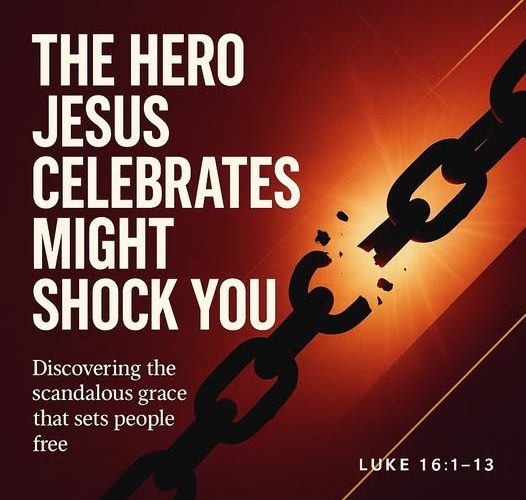When Grace Gets Messy: The Hero Jesus Actually Celebrates
When Grace Gets Messy: The Hero Jesus Actually Celebrates
Revd Adrian Roux
What if I told you that one of Jesus’ favourite characters was a dishonest manager who cheated his boss, acted purely out of self-interest, and broke every rule in the book? And that this same character teaches us the most profound lesson about what it means to follow Christ in our complex, broken world?
This Sunday, we’re diving into one of Jesus’ most uncomfortable parables: the story of the dishonest manager found only in Luke’s Gospel. It’s a tale that has made theologians squirm for centuries, and for good reason. Here’s a man who forgives massive debts without authorization, acts from entirely selfish motives, and gets commended by Jesus for it. It challenges everything we think we know about biblical heroes and moral purity.
But here’s the scandalous truth: sometimes grace works through the most unlikely people for all the wrong reasons. The tenant farmers trapped in crushing debt cycles, the kind that could never be repaid no matter how hard they worked, suddenly found themselves free. Free to breathe, free to choose, free to hope again. Sound familiar? Walk down any British high street and you’ll see the same debt traps today: payday lenders, impossible student loans, and cycles designed to keep people permanently dependent.
John Wesley understood this scandal of grace. He preached to coal miners and factory workers, insisting that God’s love wasn’t reserved for the morally upright or financially secure. Wesley’s doctrine of social holiness demands that we see personal faith and social justice as inseparable. We cannot love God without working to liberate our neighbours from whatever binds them.
This parable asks uncomfortable questions: What would it look like for the church to be agents of actual debt forgiveness? How do we practice Sabbath economics in a culture built on perpetual debt? When do our pure motives matter less than the liberation we can offer?
The dishonest manager teaches us that there are no perfect heroes in God’s kingdom—only forgiven people called to extend that forgiveness to others. In our fractured world, this isn’t just good news. It’s scandalous news. It’s Methodist news. It’s gospel.
Because sometimes the most Christ-like thing we can do is act for entirely un-Christ-like reasons, trusting that God’s grace is bigger than our motives and powerful enough to break every chain that binds.


